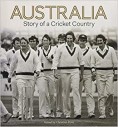Behind The Shades
Jon Gemmell |Published: 2007
Pages: 400
Author: Fletcher, Duncan and James, Steve
Publisher: Simon and Schuster
Rating: 3 stars

As a rule, I steer clear of autobiographies, but the publication of Duncan Fletcher’s life story whetted the appetite if for nothing else than his take on cricket in his homeland, Zimbabwe.
At age 12, Fletcher opened the batting for the Nyabira Country Club with ‘Boss’ Lilford, a well-known farmer who had in 1962 helped Ian Smith form the Rhodesian Front Movement, which oversaw white rule until 1979. Fletcher’s father was invited to the preparatory meetings of that party, but remained loyal to the United Federal Party, which believed that Britain should remain involved in the running of the country.
Fletcher is lukewarm to the home of his birth seeing himself as South African. He refers to the imperial Salisbury over independent Harare and emphasises Mozambique’s FRELIMO as terrorists.
England’s contests with Sri Lanka draw obvious attention and Fletcher recalls the tour of 2001 when left-arm fast-bowler Ruchira Perere racially sledged all-rounder Craig White. What upset the team was no so much Parere disparaging the ‘white race’ but that if any of the England players had made a similar comment they would be on the first plane home.
These double-standards continued to grate in the series in 2003 when Muttiah Muralitharan reported captain Nasser Hussain for making comments to his England team-mates that the Sri Lankan off-spinner was a cheat and a chucker. In comparison the abusive comments made by the talkative keeper Kumar Sangakhara were not reported by the English team.
Fletcher further expresses his disappointment at the criticism levelled at Ashley Giles for bowling leg-theory to nullify India’s Sachin Tendulkar in 2001 especially when Ted Dexter, then president of the MCC argued that it was pushing the laws of the game. Fletcher asks when had the former England captain ever complained about Muralitharan or Shane Warne for adopting similar tactics?
The most interesting part of the book deals with the 2003 World Cup and the question of whether England should have played in Zimbabwe. Fletcher has been condemned for not expressing a public opinion but he points out that not only was he travelling on a Zimbabwean passport but that many of his wife’s family were still in Zimbabwe.
When Hussain raised objections to the match on moral grounds Fletcher absented himself from discussions but warned that there many countries in the world where perhaps you shouldn’t play sport on moral grounds. He later admits his frustration at the players’ ignorance of what it was like in Zimbabwe.
When told by the ECB’s Tim Lamb that he wanted the visit to go ahead, Fletcher concurred, so that we now know his real feelings. He also reveals that the England team were visited by Andy Flower and Henry Olonga and informed of their decision to make a protest against Mugabe by wearing black armbands.
Fletcher admits at the start of his book that he likes to keep his cards close to his chest and you feel that there is still a lot to reveal. He has been England’s most successful coach and it is a shame that his book focuses less on his methods and his ideas about cricket and becomes bogged down by lengthy replies to those he feels have wronged him. Get over it Duncan and move on.






Leave a comment